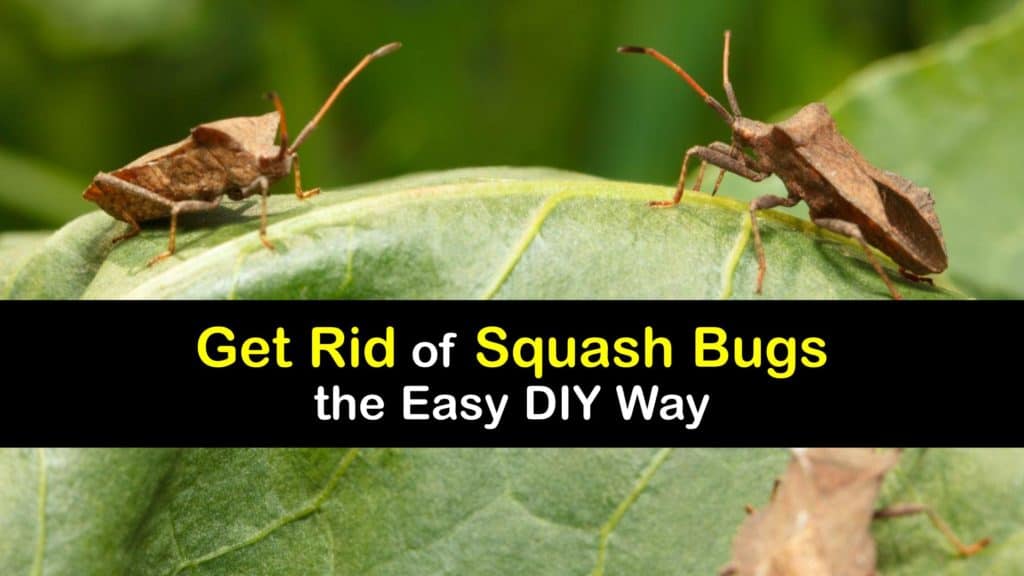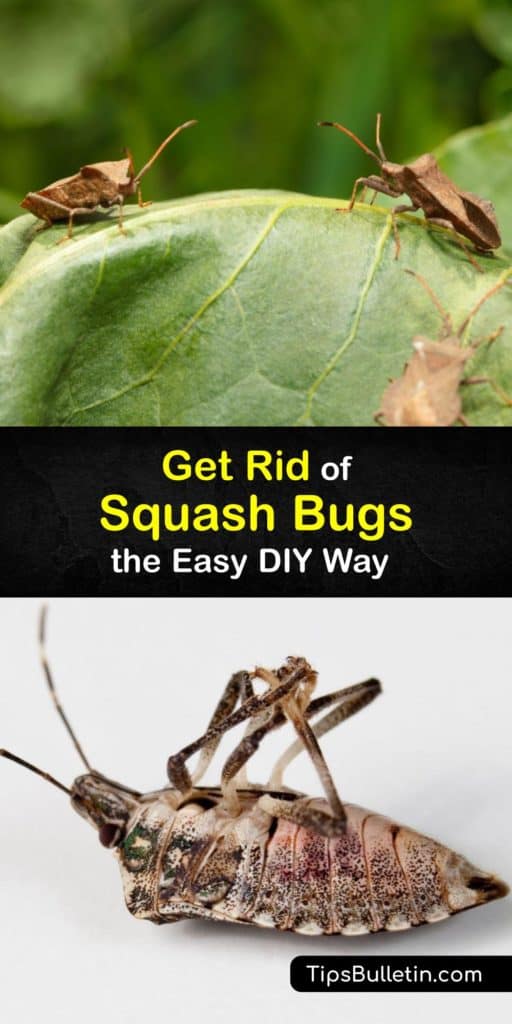Squash bugs (Anasa tristis) are garden pests that commonly target cucurbit plants like summer squash, winter squash, and zucchini. Knowing how to get rid of squash bugs in your vegetable garden is essential to protecting your plants from the damage adult bugs and squash bug nymphs cause. These pests resemble stink bugs and damage seedlings in the garden by feeding on the sap within squash plants.
Squash bugs damage plant tissue and affect the plant’s ability to grow, usually resulting in the death of young plants. Adult squash bugs are most active during spring and early summer, and as temperatures drop in fall, many young squash bugs begin to die. Nymphs die in the winter, while adult bugs tend to overwinter in the garden.
Because of their habit of staying in the garden where crops previously grew, it’s essential to clear plant debris from the garden. Any squash bug adults left in the garden emerge during spring to lay eggs on plants.

Getting Rid of Squash Bugs in Your Vegetable Garden
The timely removal of squash bugs is crucial to garden health; it is easier to remove eggs and nymphs than to kill the adult bugs. Although using insecticide may seem like the easiest way to remove pests from your garden, this article covers home remedies for getting rid of squash bugs.
Why You Should Get Rid of Squash Bug Eggs
Although adult squash bugs are often found walking on plants or garden debris because they fly, they’re harder to get rid of when trying to control the squash bug population.
Female squash bugs lay egg clusters on the underside of the squash leaf where the veins form a V. Easily remove eggs by brushing them off the leaf while wearing gloves. Brush the eggs into a plastic bag that you tie and dispose of or into soapy water to kill them. Crush eggs between your fingers if you don’t mind the mess.
Eggs hatch in roughly ten days, so put yourself on a schedule to regularly check the underside of your plant leaves for new eggs. If you’re diligent in removing eggs when fall arrives, there will be no new nymphs in the garden.

What is the Best Way to Get Rid of Squash Bugs Naturally?
If you’re dealing with a squash bug infestation, using an insecticide is beneficial to control the number of pests in the garden. While some insecticides rely on chemical control to deal with common garden pests, there are natural ways to get rid of squash bugs that don’t involve using chemicals around your plants.
Diatomaceous earth is a way to kill squash bugs in your garden organically. It is a natural method of pest control made from powdered sediment of algae—because of this, using diatomaceous earth is likely the best way to get rid of squash bugs naturally.
Food grade diatomaceous earth is safe around humans and pets, and for small insects, the sharp particles in the powder are sharp enough to pierce their bodies. Sprinkle diatomaceous around your squash plants or your entire garden to prevent insects from getting near your plants.
Neem oil for squash bugs is another option to control the presence of squash bugs naturally. After purchasing neem oil, create a homemade insecticide using neem oil and water. Neem oil has an unpleasant smell, so we suggest making your spray in an open-air space.
For an inexpensive and simple way to kill squash bugs naturally, mix water with your neem oil in a 16-ounce spray bottle. Follow the label instructions for safely using neem oil when applying it to leaf surfaces and any locations you find bugs. This organic squash bug repellent spray is safe for your crops as well as flowers in the garden.
How to Get Rid of Squash Bugs through Companion Planting
Companion planting is an essential system to enhance your garden’s productivity and improve the health of your plants. The right combination of crops passively protects your plants from pests and improves your favorite crops’ flavor or growth rate.
While some companion plants repel pests from the garden, some equally essential plants function as trap crops to take squash bug damage for other crops. Many plants and flowers that repel squash bugs are a delightful addition to the garden.
To protect plants from the attack of squash bugs, nasturtium is an excellent place to start. These flowers add color to the garden, and the smell produced from their edible flowers wards away various pests, including squash vine borers. Marigolds are exceptional DIY squash bug trap plants and keep pests like nematodes away.
Some of the stronger smelling plants are good companion plants because they keep pests out. The smell of mint and catnip in the garden is an effective way of getting rid of squash beetles and the way to get rid of cucumber beetles, as well as many other bugs.
Another step for getting rid of squash beetles and bugs is to target your trap crops with homemade insecticides. As pests become drawn to other plants in your garden, take the opportunity to kill pests that visit those plants to reduce the number of pests.
Attract Beneficial Insects to Get Rid of Squash Beetles
Some companion plants keep insects away, while some plants draw insects. Plants like dill and many flowers attract beneficial insects. A beneficial insect helps your garden by pollinating the flowers of your plants or feeding on pests.
Bees and butterflies are pollinators, and adding flowers is an easy way to entice them to visit your garden. The smell of dill plants functions the same way, attracting these insects to help pollinate plants to ensure your plants produce fruit.
Lacewings and lady beetles like ladybugs don’t harm plants; they seek food by preying on smaller insects that may be running rampant in your garden—some wasps, like the scelionid wasp, implant parasites into the eggs of squash bugs.
Avoiding Squash Bugs in Your Garden
Squash bugs are usually dormant during the winter months, so any squash you’re growing during the colder part of the year may not be at as much risk of squash bug damage. Newly hatched bugs and nymphs can’t handle the colder weather and die in the cold. Adult squash bugs overwinter in the garden or locations near your home.
Because these bugs overwinter outside, usually under plant debris left in the garden beds, one way to prevent these bugs from damaging your crops in the spring is to clean the garden of debris. Remove any plant debris from fall harvest or any plant litter left behind from pruning.
Crop rotation is another effective way to prevent squash bugs from targeting your crops and to avoid soil-borne diseases and one of the best home remedies for stink bugs too. Avoid planting squash plants in the same location year after year.
In combination with clearing your garden of debris, prevent the presence of squash bugs by changing the planting arrangement of your crops each season.
Another way to limit the presence or damage of squash bugs is to plant varieties of crops that are resistant to these bugs. Butternut squash and royal acorn are two types of squash plants that resist bugs.
Getting Rid of Squash Beetles Using Homemade Insecticide
Aside from squash borers, beetles are another common pest that targets plants. Some beetles are beneficial and feed on insects, but squash beetles enjoy feeding on the leaves of squash plants. These beetles resemble ladybugs, but they are yellow with black spots.
Squash beetles are easily mistaken for cucumber beetles, although their bodies are rounder than cucumber beetles. Additionally, the eggs that these beetles leave on your plants may resemble the eggs of beneficial insects.
If you leave a cluster of eggs undisturbed, you risk allowing a generation of squash beetles to hatch and feed on your garden plants. These beetles target the underside of leaves, and if left untreated, an infestation reduces your leaves to a skeleton of veins.
This damage makes photosynthesis nearly impossible if the damage is severe enough. It may not prove fatal for plants close to reaching maturity, but young plants die. To counter the presence of squash beetles in your garden, create a quick and straightforward soap spray to kill pests on your plants.
Combine one cup of water with soap in an eight-ounce spray bottle and spray directly on your plant leaves. If you notice any insects, apply the spray directly onto them. Soap dissolves the exoskeleton of some insects, killing them.
Depending on the importance of squash plants in your garden, you may need to do more than just keep squash bugs at bay. With our guide, we hope you have everything needed to eliminate squash bugs from your vegetable garden and protect your crops.

If you learned how to get rid of squash bugs with help from our guide, please share our tips on the best way to get rid of squash bugs naturally with your fellow gardeners on Facebook and Pinterest.